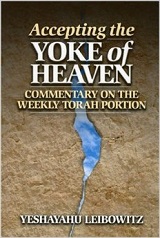 Edit article
Edit articleSeries
Prof. Yeshayahu Leibowitz: Torah from Sinai as a Normative Statement

Professor Yeshayahu Leibowitz (1903 – 1993). Credit: Bracha L. Ettinger, Wikimedia CC-BY-SA 2.5
A far more radical break with cognitive truth as a criterion for establishing the divinity of the Torah is exhibited in the thought of Professor Yeshayahu Leibowitz.[1] During my student days, Leibowitz was famous for his thundering pronouncements in public lectures that “the Torah is not a HISTORY book, nor is it a textbook in PHYSICS!” By this he meant to emphasize the sharp distinction between empiric or scientific statements on the one hand, and statements of value (“religious facts”) which cannot be verified or refuted empirically on the other.
Leibowitz, to the best of my knowledge, never offered any straightforward, unequivocal statement as to whether he believed the biblical account of the Sinai event had any historical grounding.[2] What he certainly did assert, however, even more emphatically than Soloveitchik, was that this question was totally meaningless in a religious context and irrelevant in establishing the sanctified status of the Torah.
As opposed to Soloveitchik, Leibowitz did not see the Torah as “speaking for itself.”[3] It is not its timeless existential message that grants the Torah its sanctity, nor the accuracy of its description of the circumstances surrounding its transmission, but rather the practical role assigned to it by historical Judaism. Rather than teach us about a past event in which God spoke to Moses, or convey any current sense of God’s presence seeping through the lines of the text, the proposition that “God gave the Torah” is a normative statement that comes to express recognition of our obligation to assume the yoke of the Torah and its commandments. Thus, instead of revelation providing the basis for a particular way of life, it is this way of life, and – more specifically – the particular mindset reflected in the halakhic tradition of the Oral Law, which grants the Torah its revelatory status as the word of God and establishes its prescriptions as binding.[4]

Despite his rejection of supernaturalism, Leibowitz was a deeply religious person who would vociferously object to the contention that religion has no ontological grounding (i.e., existence in “reality”). Leibowitz’s reservations regarding a literal understanding of religious propositions – unlike those of Mordechai Kaplan – do not stem from a full-fledged flight from metaphysics, but rather from a Kantian-like objection to applying human categories to an absolutely transcendent God, which he relates to Maimonides as well.
Thus, in his eyes, accepting the Torah as God’s word mandates engaging the Torah in an interpretive project. The objective of such a project is to translate the ostensibly supernatural connotations of its mythological language, which speaks of God’s revelation and intervention in worldly affairs, into terms that are theologically compatible with this Kantian/Maimonidian constraint – i.e., as bearing a normative thrust, rather than conveying any informative content.
Leibowitz’s rule of thumb for demythologizing the language of the Torah[5] is to translate the statements in which God is the subject into statements where the individual is the subject and God is the object. Let’s look at his treatment of the opening verse of Genesis as an example. The verse states, “In the beginning God created the heaven and the earth.” This words make no sense theologically, God is above time. Neither do they makes sense empirically, because they correspond to nothing in our natural experience., Therefore, Leibowitz re-interprets these words to teach us a religious lesson:
“What I [Leibowitz] learn from this verse is the great principle of faith, that the world is not God – the negation of atheism and pantheism”.[6]
Similarly, the proposition “God gave the Torah”, which is equally unintelligible both theologically and empirically, is now understood not as a “religious fact”, but as “the obligation compelling the individual to worship God.”[7] Because God’s absolute transcendence precludes any revelation of God’s self in the world, Leibowitz grounds the ultimate authority of the Torah as God’s word exclusively on the voluntary decision of the rabbinic Sages to accept it as such, rather than on any objective historical occurrence.[8] Undertaking the performance of mitzvot for its own sake without any thought of attunement to human needs is the only way of relating to a Being who is by definition inscrutable and totally “Other”.[9]
TheTorah.com is a 501(c)(3) nonprofit organization.
We rely on the support of readers like you. Please support us.
Published
March 25, 2014
|
Last Updated
October 24, 2025
Previous in the Series
Next in the Series
Before you continue...
Thank you to all our readers who offered their year-end support.
Please help TheTorah.com get off to a strong start in 2025.
Footnotes

Prof. Tamar Ross is Professor Emeritus of the Department of Jewish philosophy at Bar Ilan University. She continues to teach at Midreshet Lindenbaum. She did her Ph.D. at the Hebrew University and served as a post-doctoral fellow at the Center for Jewish Studies at Harvard. She is the author of Expanding the Palace of Torah: Orthodoxy and Feminism. Her areas of expertise include: concepts of God, revelation, religious epistemology, philosophy of halacha, the Musar movement, and the thought of Rabbi A.I. Kook.
Essays on Related Topics:









